The SSD Relapse: Understanding and Choosing the Best SSD
by Anand Lal Shimpi on August 30, 2009 12:00 AM EST- Posted in
- Storage
Why SSDs Care About What You Write: Fragmentation & Write Combining
PC Perspective's Allyn Malventano is a smart dude, just read one of his articles to figure that out. He pieced together a big aspect of how the X25-M worked on his own, a major key to how to improve SSD performance.
You'll remember from the Anthology that SSDs get their high performance by being able to write to multiple flash die across multiple channels in parallel. This works very well for very large files since you can easily split the reads and writes across multiple die/channels.
Here we go to write a 128KB file, it's split up and written across multiple channels in our tiny mock SSD:
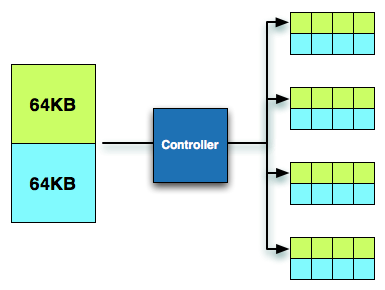
When we go to read the file, it's read across multiple channels and performance is once again, excellent.
Remember what we talked about before however: small file random read/write performance is actually what ends up being slowest on hard drives. It's what often happens on a PC and thus we run into a problem when performing such an IO. Here we go to write a 4KB file. The smallest size we can write is 4KB and thus it's not split up at all, it can only be written to a single channel:
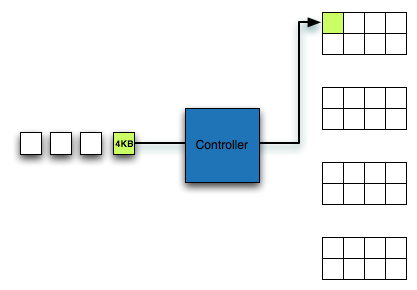
As Alyn discovered, Intel and other manufacturers get around this issue by combining small writes into larger groups. Random writes rarely happen in a separated manner, they come in bursts with many at a time. A write combining controller will take a group of 4KB writes, arrange them in parallel, and then write them together at the same time.
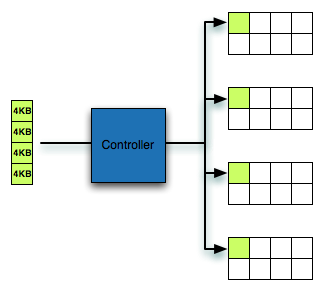
This does wonders for improving random small file write performance, as everything completes as fast as a larger sequential write would. What it hurts is what happens when you overwrite data.
In the first example where we wrote a 128KB file, look what happens if we delete the file:
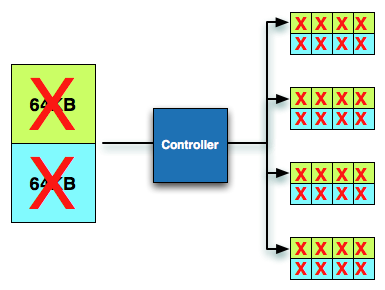
Entire blocks are invalidated. Every single LBA in these blocks will come back invalid and can quickly be cleaned.
Look at what happens in the second example. These 4KB fragments are unrelated, so when one is overwritten, the rest aren't. A few deletes and now we're left with this sort of a situation:
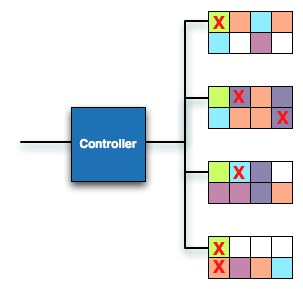
Ugh. These fragmented blocks are a pain to deal with. Try to write to it now and you have to do a read-modify-write. Without TRIM support, nearly every write to these blocks will require a read-modify-write and send write amplification through the roof. This is the downside of write combining.
Intel's controller does its best to recover from these situations. That's why its used random write performance is still very good. Samsung's controller isn't very good at recovering from these situations.
Now you can see why performing a sequential write over the span of the drive fixes a fragmented drive. It turns the overly fragmented case into one that's easy to deal with, hooray. You can also see why SSD degradation happens over time. You don't spend all day writing large sequential files to your disk. Instead you write a combination of random and sequential, large and small files to the disk.










295 Comments
View All Comments
GourdFreeMan - Tuesday, September 1, 2009 - link
Yes, rewriting a cell will refill the floating gate with trapped electrons to the proper voltage level unless the gate has begun to wear out, so backing up your data, secure erasing your drive and copying the data back will preserve the life (within reason) of even drives that use minimalistic wear leveling to safeguard data. Charge retention is only a problem for users if they intend to use the drive for archival storage, or operate the drive at highly elevated temperatures.It is a bigger problem for flash engineers, however, and one of the reasons why MLC cannot be moved easily to more bits per cell without design changes. To store n-bits in a single cell you need 2^n separate energy levels to represent them, and thus each bit is only has approximately 1/(2^(n-1)) the amount of energy difference between states when compared to SLC using similar designs and materials.
Zheos - Tuesday, September 1, 2009 - link
Man you seem to know a lot about what you're talking about :)Yeah now i understand why SSD for database and file storage server would be quite a bad idea.
But for personal windows & everyday application storage, seems like a pure win to me if you can afford one :)
I was only worried about its life-span but thankx to you and you're quick replys (and for the maths and technical stuff about how it realy work ;) im sold on the fact that i will buy one soon.
The G2 from Intel seems like the best choice for now but I'll just wait and see how it's going when TRIM will become almost enable on every SSD and i'll make my decision there in a couple of months =)
GourdFreeMan - Wednesday, September 2, 2009 - link
It isn't so much that SSDs make a bad storage server, but rather that you can't neglect to make periodic backups, as with any type of storage, if your data has great monetary or sentimental value. In addition to backups, RAID (1-6) is also an option if cost is no object and you want to use SSDs for long term storage in a running server. Database servers are a little more complicated, but SSDs can be an intelligent choice there as well if your usage patterns aren't continuous heavy small (i.e. <= 4K) writes.I plan on getting a G2 myself for my laptop after Intel updates the firmware to support TRIM and Anand reviews the effects in Windows 7, and I have already been using an Indilinx-based SLC drive in my home server.
If you do anything that stresses your hard drive(s), or just like snappy boot times and application load times you will probably be impressed by the speeds of a new SSD. The cost per GB and lack of long term reliability studies are really the only things holding them back from taking the storage market by storm now.
ninevoltz - Thursday, September 17, 2009 - link
GourdFreeMan could you please continue your explanation? I would like to learn more. You have really dived deeply into the physical properties of these drives.GourdFreeMan - Tuesday, September 1, 2009 - link
Minor correction to the second paragraph in my post above -- "each bit is only has" should read "each representation only has" in the last sentence.philosofool - Monday, August 31, 2009 - link
Nice job. This has been a great series.I'm getting a SSD once I can get one at $1/GB. I want a system/program files drive of at least 80GB and then a conventional HDD (a tenth of the cost/GB) for user data.
Would keeping user data on a conventional HDD affect these results? It would seem like it wouldn't, but I would like to see the evidence.
I would really like to see more benchmarks for these drives that aren't synthetic. Have you tried things like Crysis or The Witcher load times? (Both seemed to me to have pretty slow loads for maps.) I don't know if these would be affected, but as real world applications, I think it makes sense to try them out.
Anand Lal Shimpi - Monday, August 31, 2009 - link
Personally I keep docs on my SSD but I keep pictures/music on a hard drive. Neither gets touched all that often in the grand scheme of things, but one is a lot smaller :)In The SSD Anthology I looked at Crysis load times. Performance didn't really improve when going to an SSD.
Take care,
Anand
Eeqmcsq - Monday, August 31, 2009 - link
I would have thought that the read speed of an SSD would have helped cut down some of the compile time. Is there any tool that lets you analyze disk usage vs cpu usage during the compile time, to see what percentage of the compile was spent reading/writing to disk vs CPU processing?Is there any way you can add a temperature test between an HDD and an SSD? I read a couple of Newegg reviews that say their SSDs got HOT after use, though I think that may have just been 1 particular brand that I don't remember. Also, there was at least one article online that tested an SSD vs an HDD and the SSD ran a little warmer than the HDD.
Also, garbage collection does have one advantage: It's OS independent. I'm still using Ubuntu 8.04 at work, and I'm stuck on 8.04 because my development environment WORKS, and I won't risk upgrading and destabilizing it. A garbage collecting SSD would certainly be helpful for my system... though your compiling tests are now swaying me against an SSD upgrade. Doh!
And just for fun, have you thought about running some of your benchmarks on a RAM drive? I'd like to see how far SSDs and SATA have to go before matching the speed of RAM.
Finally, any word from JMicron and their supposed update to the much "loved" JMF602 controller? I'd like to see some non-stuttering cheapo SSDs enter the market and really bring the $$$/GB down, like the Kingston V-series. Also, I'd like to see a refresh in the PATA SSD market.
"Am I relieved to be done with this article? You betcha." And I give you a great THANK YOU!!! for spending the time working on it. As usual, it was a great read.
Per Hansson - Monday, August 31, 2009 - link
Photofast have released Indilinx based PATA drives;http://www.photofastuk.com/engine/shop/category/G-...">http://www.photofastuk.com/engine/shop/category/G-...
aggressor - Monday, August 31, 2009 - link
What ever happened to the price drops that OCZ announced when the Intel G2 drives came out? I want 128GB for $280!